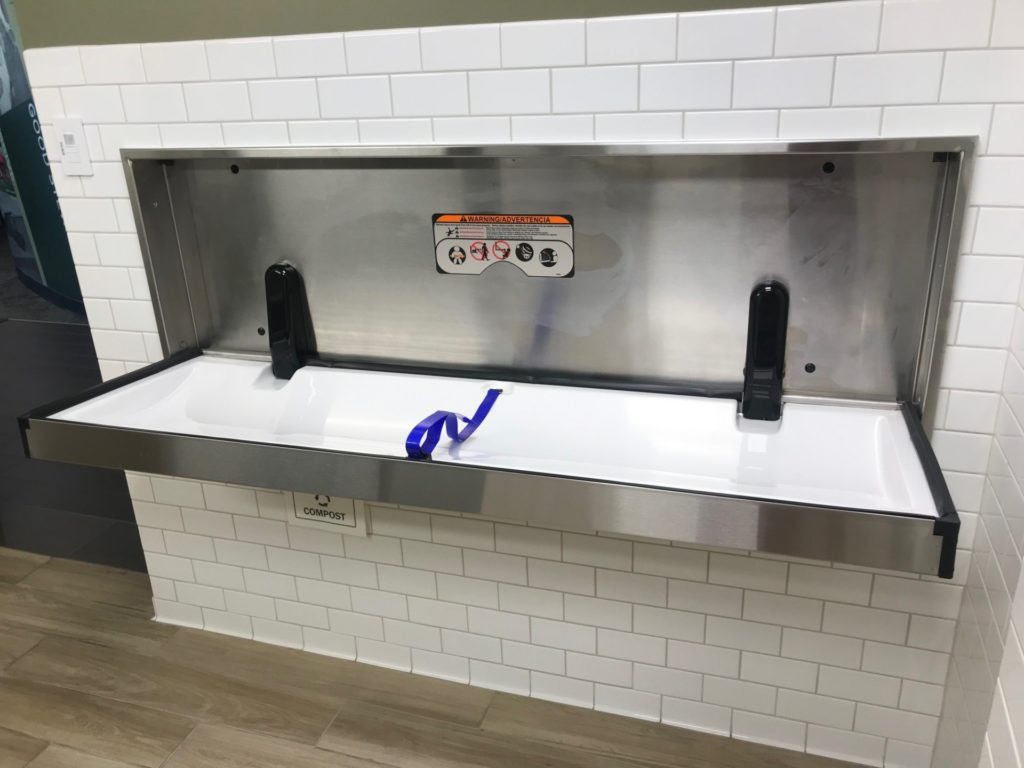
CSU has placed an adult-sized changing table in multiple buildings across the University’s campuses. (Photo: Jessica Kramer)
A few years ago, Jessica Kramer remembers that a mother called the Colorado State University Little Shop of Physics and said that her middle school-aged child wanted to attend their annual event on campus.
The mother explained her child was in a wheelchair and needed a changing table, but couldn’t fit on the ones built for young children.
“It made me realize that there are a lot of people with disabilities who have a caregiver who helps change them,” Kramer, a CSU landscape architect and member of the Inclusive Physical and Virtual Campus Committee, said. “It brought to our attention that while you don’t envision a lot of people need these adult changing tables, you never know.”
That child ultimately ended up missing the event, but Kramer and the IPVCC worked to ensure that others wouldn’t have to. There is now an adult changing table in the Occupational Therapy building as well as the Temple Grandin Equine Center, and another is being added to the Lory Student Center with the latest round of renovations.
This is just one example of the work the IPVCC does. The group of community members from across CSU meet once per month to determine what the University can do to make campus more accessible for everyone.
“Whether students or staff, we want to make sure that CSU is a welcoming place,” Kramer said.
In addition to adult changing tables, other inclusive resources on the CSU campus include all gender restrooms, lactation rooms and reflection spaces for people of all religious backgrounds. The IPVCC has also worked with the University to design a custom podium that’s accessible for instructors of all ability levels.
These resources are included on CSU’s campus map, and more are being added to the University as requested by students and as funds become available.
To make a recommendation to the IPVCC for inclusive resources, visit https://col.st/I3Cgf.
Here’s a look at all the inclusive resources available at CSU:
Accessibility By Design
Accessibility By Design is a CSU resource with tutorials on creating inclusive electronic content, including formats such as Word, PDF, PowerPoint, web content, Canvas courses and videos. The site also provides tips for purchasing new technology with inclusion in mind.
Assistive Technology Resource Center
The Assistive Technology Resource Center ensures equal access to technology and electronic information for CSUstudents and employees with disabilities as defined by the Americans with Disabilities Act and Sections 504 and 508 of the Rehabilitation Act. Services include assistive technology assessments and training, as well as consultation and education regarding accessibility and universal design of mainstream and instructional technologies.
CSU Policy Library
The CSU Policy Library contains the full text of university policies along with links to related procedures, documents and resources. You can browse by subject matter or search for policies using keywords.
CSU’s Interactive Map
Use the map to find popular destinations, departments and programs, parking and other features. You can apply map filters to locate ADA accessible parking and walkways, inclusive resources and much more.
CSU’s Service Dogs and Emotional Support Animals Policy
CSU’s Tobacco Policy
For the health of the university community, CSU is smoke-free, vape-free and tobacco-free.
CSU’s Accessibility of Electronic Information and Technologies Policy
Facilities Management
The Facilities Management Department is committed to quality competitive service. Its mission is to anticipate and provide the physical environment, which enables CSU to achieve its objectives in instruction, research, and public service.
Health Resources
CSU Health Network provides a landing page for health related resources, including information on substance use, mental health, sexual health, stress management and sleep. For a complete list of topics visit their webpage.
Housing & Dining Services
Housing & Dining Services offers a variety of housing options for everyone on campus, promotes respectful and supportive learning communities and offers inclusive dining options.
- Themed Communities & Housing Options include: gender-inclusive “Open Housing”, “Substance Free Housing”, and an “Animal Free Floor.”
- Eat Well @ CSU provides information about dietary needs including food allergies/intolerances and Halal/Kosher options.
Office of Equal Opportunity
Ensures the University’s obligations of equal access and equal opportunity in education and employment for all faculty, staff and students. Employees with a disability and others requiring accommodations should contact the Office of Equal Opportunity.
Student Diversity Programs and Services
CSU is home to several student diversity programs and services. These offices emphasize, appreciate, and support specific segments of the student body, furthermore their services and programs are available to benefit all students at CSU. The offices include the Asian Pacific American Cultural Center, Black/African American Cultural Center, El Centro, Pride Resource Center, Native American Cultural Center, Student Disability Center and the Women and Gender Advocacy Center.
Tell Someone
Tell Someone is a confidential reporting line for anyone with concerns about safety or mental health issues – either your own or someone else’s. This includes concerns about discrimination and harassment. You can reach the Tell Someone phone line during working hours (or leave a message after hours).
Office for Inclusive Excellence
The Office for Inclusive Excellence (OIE) fosters an inclusive environment that promotes and nurtures diversity, broadly defined, at CSU. Its goal is to further develop an environment where all members of the University community are welcomed, valued, and affirmed.
CSU Design Standards
The CSU Planning, Design and Construction Standards provide criteria to architects/engineers/designers as they complete project designs. There are inclusivity standards for all gender restrooms, break rooms, changing tables, commuter showers, indoor bicycle facilities, lactation rooms and reflection spaces. These standards can be found under Chapter 06 of the CSU Planning, Design and Construction standards website.